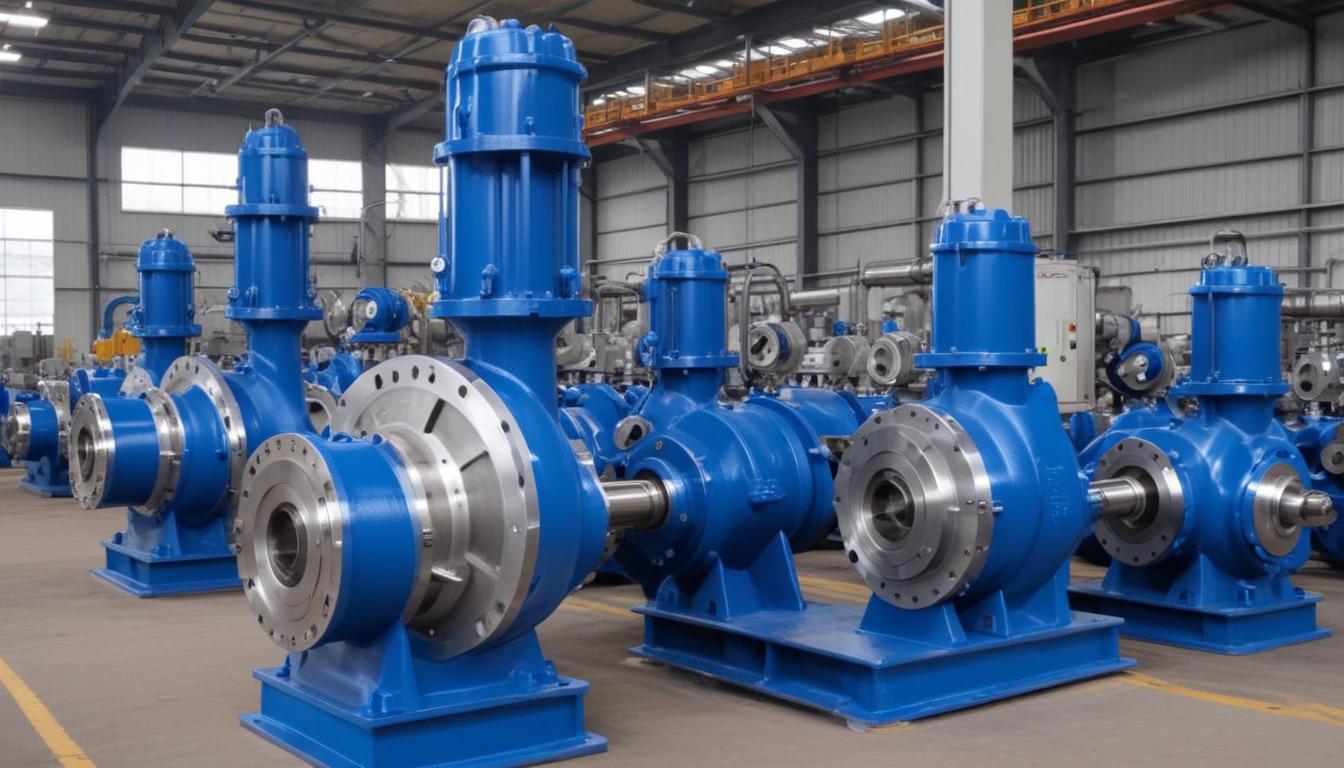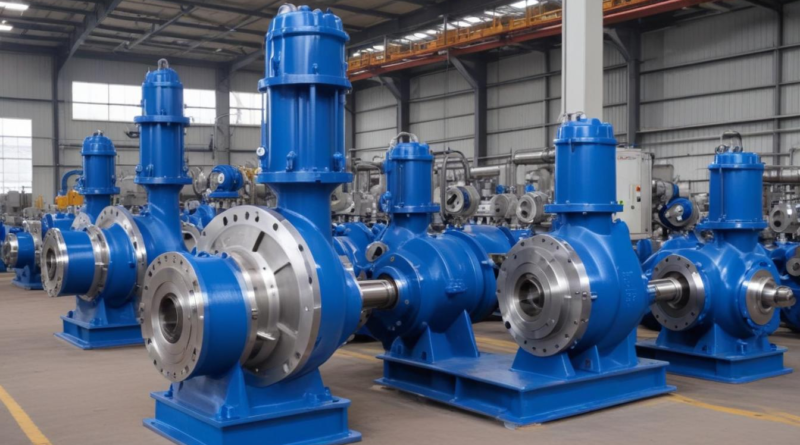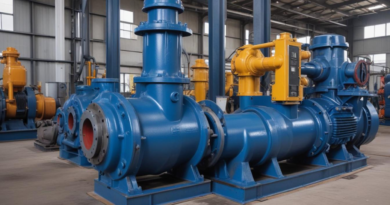the benefits of using gear pumps in chemical processing
Gear pumps provide several advantages in chemical processing, making them a preferred choice for many applications within the industry. Their positive displacement design ensures a consistent and accurate flow rate, which is essential for maintaining precise control over chemical reactions and processes.
One key benefit is their ability to handle a wide range of fluid viscosities. Whether dealing with highly viscous slurries or low-viscosity solvents, gear pumps maintain their performance without significant adjustments. This versatility reduces the need for multiple types of pumps within a processing facility, streamlining operations and equipment management.
Additionally, gear pumps are known for their reliability and durability. Constructed with robust materials, they can withstand harsh chemical environments, including corrosive and abrasive substances commonly encountered in chemical processing. This resilience minimizes downtime and extends the service life of the pump, contributing to lower operational costs.
Another significant advantage is their self-priming capability. Gear pumps can evacuate air from the system and begin pumping without manual priming, enhancing operational efficiency and reducing the potential for errors during startup. This feature is particularly beneficial in processes where continuous operation is critical.
Moreover, gear pumps offer low shear pumping, which is crucial for handling shear-sensitive materials that can degrade or lose efficacy when subjected to high shear forces. By maintaining the integrity of such materials, gear pumps help ensure the quality and effectiveness of the final chemical products.
The design of gear pumps also facilitates easy maintenance and cleaning, which is vital in chemical processing to prevent cross-contamination and ensure safe operations. Their straightforward construction allows for quick disassembly and servicing, reducing maintenance time and labor costs.
| Advantage | Description |
|---|---|
| Consistent Flow | Maintains accurate and steady flow rates essential for precise chemical reactions. |
| Versatility | Handles a wide range of viscosities and chemical compositions effectively. |
| Durability | Robust construction withstands harsh and corrosive chemical environments. |
| Self-Priming | Operates efficiently without the need for manual priming, reducing startup time. |
| Low Shear | Prevents degradation of shear-sensitive materials, maintaining product quality. |
| Ease of Maintenance | Simple design allows for quick disassembly and servicing, minimizing downtime. |
how gear pumps enhance efficiency
Gear pumps significantly contribute to enhancing operational efficiency within chemical processing environments. Their precise flow control ensures that chemical reactions proceed under optimal conditions, minimizing variability and maximizing product consistency. This accuracy is crucial for processes that require exact dosing and mixture ratios, thereby reducing the likelihood of errors and improving overall process reliability.
One of the primary factors in energy efficiency is the inherent design of gear pumps. As positive displacement pumps, they maintain a constant flow rate regardless of system pressure variations, which allows for more predictable and stable energy consumption compared to other pump types. This stability not only optimizes energy usage but also contributes to lower operational costs over time.
Furthermore, the self-priming capability of gear pumps plays a vital role in enhancing efficiency. By eliminating the need for manual priming, these pumps reduce startup time and streamline the initiation of processes. This feature is particularly beneficial in continuous operation scenarios, where maintaining an uninterrupted workflow is essential for productivity.
The reliability and durability of gear pumps also translate to increased efficiency. Their robust construction minimizes the frequency of maintenance and unexpected downtimes, ensuring that chemical processing operations run smoothly and without interruptions. This reliability extends the lifespan of the equipment, providing long-term economic benefits and reducing the need for frequent replacements.
Additionally, the compact design of gear pumps allows for easier integration into existing systems, optimizing plant layout and space utilization. This efficiency in spatial management can lead to improved workflow and reduced complexity in plant operations.
To summarize the key ways gear pumps enhance efficiency in chemical processing, consider the following points:
- Precise Flow Control: Ensures accurate dosing and consistent product quality.
- Energy Efficiency: Maintains stable energy consumption, reducing operational costs.
- Self-Priming: Minimizes startup time and supports continuous operations.
- Reliability: Decreases maintenance frequency and prevents unexpected downtimes.
- Compact Design: Facilitates easy integration and optimizes plant layout.
Moreover, the ability of gear pumps to handle a wide range of viscosities without compromising performance further contributes to process efficiency. Whether dealing with thick slurries or thin solvents, gear pumps adapt seamlessly, reducing the need for multiple pumping solutions and simplifying the overall system design.
| Efficiency Enhancement | Description |
|---|---|
| Precise Flow Control | Maintains accurate flow rates for consistent chemical reactions and product quality. |
| Energy Efficiency | Ensures stable energy consumption, leading to lower operational costs. |
| Self-Priming | Reduces startup time and supports uninterrupted continuous operations. |
| Reliability | Minimizes maintenance needs and prevents unexpected downtimes. |
| Compact Design | Allows for efficient integration into existing systems and optimizes space usage. |
| Versatility in Viscosity Handling | Adaptable to a wide range of fluid viscosities, reducing the need for multiple pump types. |
By leveraging these efficiency-enhancing features, gear pumps enable chemical processing facilities to achieve higher productivity, reduced operational costs, and improved overall performance. Their ability to deliver consistent and reliable pumping performance is integral to maintaining streamlined and efficient industrial operations.
durability and reliability in harsh environments
Gear pumps are engineered to perform reliably in some of the most demanding and corrosive environments found in the chemical processing industry. Their durability and reliability are critical factors that ensure consistent operation and minimize downtime, even under extreme conditions.
One of the primary reasons for their robustness is the selection of high-quality materials. Components such as gears, housings, and seals are often constructed from superior alloys and corrosion-resistant materials like stainless steel, Hastelloy, or other specialized alloys. These materials are chosen specifically to withstand exposure to aggressive chemicals, high temperatures, and abrasive substances typically encountered in chemical processing applications.
In addition to material selection, the design of gear pumps incorporates several features that enhance their ability to endure harsh environments:
- Sealed Bearings: Protect the internal components from contamination and leakage, ensuring smooth and uninterrupted operation.
- Precision Machining: Ensures tight tolerances and reduces wear and tear, extending the lifespan of moving parts.
- Corrosion-Resistant Coatings: Provide an extra layer of protection against chemical attack, enhancing longevity.
- Redundant Sealing Systems: Prevent leaks and maintain system integrity even when exposed to high-pressure conditions.
Moreover, gear pumps are designed for easy maintenance, which is essential for operations in harsh environments. Their modular construction allows for quick access to critical components, facilitating routine inspections and repairs without significant downtime. This ease of maintenance not only prolongs the life of the pump but also ensures that any wear or damage can be promptly addressed before it leads to system failures.
The reliability of gear pumps is further enhanced by their ability to maintain performance consistency over long periods. Unlike some other pump types that may experience performance degradation due to wear or environmental stressors, gear pumps continue to deliver stable flow rates and pressure levels. This consistent performance is vital in chemical processing, where precise control over fluid movement is necessary to maintain reaction conditions and product quality.
Additionally, gear pumps exhibit excellent resistance to cavitation and shear forces. Cavitation can cause significant damage to pump components, leading to decreased efficiency and potential system failures. Gear pumps mitigate this risk through their design, which ensures smooth fluid handling and reduces the likelihood of vapor bubble formation. Similarly, their low-shear operation preserves the integrity of sensitive chemical mixtures, preventing unwanted side reactions or degradation of product quality.
Key Factors Contributing to Durability and Reliability:
- Material Selection: Use of corrosion-resistant and high-strength materials to withstand aggressive chemicals and high temperatures.
- Robust Design: Incorporation of features like sealed bearings and precision machining to reduce wear and enhance longevity.
- Maintenance Accessibility: Modular construction that allows for easy access to components for inspections and repairs.
- Consistent Performance: Ability to maintain stable flow rates and pressures over extended periods.
- Resistance to Cavitation: Design features that minimize the formation of vapor bubbles and protect against cavitation damage.
| Feature | Benefit |
|---|---|
| Corrosion-Resistant Materials | Extends pump life by preventing material degradation in aggressive chemical environments. |
| Precision Engineering | Ensures tight tolerances and reduces wear, maintaining performance consistency. |
| Sealed Bearings | Protects internal components from contamination and leakage, enhancing reliability. |
| Modular Construction | Facilitates easy maintenance and reduces downtime through quick component access. |
| Anti-Cavitation Design | Prevents damage from vapor bubbles, ensuring smooth and uninterrupted operation. |
The benefits of using gear pumps in harsh chemical processing environments are clear. Their ability to withstand extreme conditions without compromising performance makes them an invaluable asset in maintaining efficient and reliable chemical production processes. By investing in durable and reliable gear pump systems, chemical processing facilities can achieve sustained operational excellence and reduce the risks associated with equipment failure.
cost-effectiveness of gear pump systems
 The economic advantages of implementing gear pump systems in chemical processing are substantial, making them a highly cost-effective choice for many facilities. One of the primary factors contributing to their cost-effectiveness is the reduced maintenance costs associated with gear pumps. Their robust construction and high-quality materials minimize wear and tear, which in turn lowers the frequency and extent of maintenance required. This durability translates to fewer service interruptions and lower labor costs over the pump’s lifespan.
The economic advantages of implementing gear pump systems in chemical processing are substantial, making them a highly cost-effective choice for many facilities. One of the primary factors contributing to their cost-effectiveness is the reduced maintenance costs associated with gear pumps. Their robust construction and high-quality materials minimize wear and tear, which in turn lowers the frequency and extent of maintenance required. This durability translates to fewer service interruptions and lower labor costs over the pump’s lifespan.
Energy efficiency is another critical aspect of cost savings. Gear pumps operate with a high degree of mechanical efficiency, ensuring that more of the input energy is effectively utilized for pumping rather than being lost as heat or friction. This efficiency not only reduces the overall energy consumption of the facility but also leads to significant cost savings on utility bills. Additionally, the consistent performance of gear pumps ensures stable energy usage, avoiding the spikes and inefficiencies often associated with other pump types.
The initial investment in gear pumps is often offset by their long-term benefits. While the upfront cost may be comparable to or slightly higher than other pump types, the extended lifespan and lower total cost of ownership make gear pumps a financially prudent choice. Their ability to handle a variety of chemical viscosities and compositions eliminates the need for multiple specialized pumps, further reducing capital expenditure and simplifying inventory management.
Minimizing downtime is another crucial factor in the cost-effectiveness of gear pump systems. Due to their reliability and ease of maintenance, gear pumps experience fewer unexpected failures and require less frequent servicing. This reliability ensures continuous operation of chemical processing systems, preventing costly production stoppages and enhancing overall productivity. The ability to quickly service and replace components also means that any necessary repairs can be conducted with minimal disruption, maintaining operational continuity.
Furthermore, gear pumps contribute to cost savings through their versatile application in various chemical processes. Their adaptability means that a single type of pump can be used across multiple stages of production, reducing the need for diverse equipment and simplifying process engineering. This versatility not only lowers equipment costs but also streamlines training and operational procedures, leading to further efficiency and savings.
To summarize the cost-effectiveness of gear pump systems, consider the following key factors:
- Reduced Maintenance Costs: Durable construction minimizes wear and lowers maintenance frequency.
- Energy Efficiency: High mechanical efficiency leads to lower energy consumption and reduced utility bills.
- Longer Lifespan: Extended operational life reduces the need for frequent replacements and capital expenditures.
- Minimized Downtime: Reliability and ease of maintenance ensure continuous operation and prevent costly stoppages.
- Versatility: Adaptable to various chemical processes, eliminating the need for multiple pump types and simplifying operations.
Additionally, the economic benefits of gear pumps can be illustrated through the following table:
| Cost Factor | Impact |
|---|---|
| Maintenance Costs | Lower maintenance frequency and costs due to durable construction. |
| Energy Consumption | Higher energy efficiency results in reduced utility expenses. |
| Replacement Frequency | Longer lifespan decreases the need for frequent pump replacements. |
| Operational Downtime | Enhanced reliability prevents unexpected shutdowns, maintaining productivity. |
| Equipment Versatility | Single pump type suitable for multiple applications reduces capital investment. |
In conclusion, the cost-effectiveness of gear pump systems arises from their ability to minimize maintenance and energy costs, extend operational lifespans, reduce downtime, and simplify equipment requirements. These economic benefits make gear pumps a valuable investment for chemical processing facilities aiming to optimize their operations and achieve long-term financial sustainability.
application examples in the chemical industry
Gear pumps play a pivotal role in a variety of chemical processing applications, demonstrating their versatility and efficiency across different industries. Their ability to handle diverse chemical compositions and operational demands makes them indispensable in several key areas:
- Polymer Production: In the manufacture of polymers, precise and consistent flow rates are essential to ensure the uniformity and quality of the final product. Gear pumps facilitate the accurate dosing of monomers and additives, maintaining the integrity of the polymerization process.
- Pharmaceutical Manufacturing: The pharmaceutical industry requires meticulous control over fluid handling to maintain product purity and efficacy. Gear pumps provide the necessary precision and reliability for transferring active pharmaceutical ingredients (APIs) and excipients without contamination.
- Chemical Blending: Efficient and accurate blending of various chemicals is critical in producing homogeneous mixtures. Gear pumps ensure consistent flow rates and thorough mixing, enhancing the quality and performance of the final chemical blends.
- Wastewater Treatment: In wastewater treatment facilities, gear pumps are used to transfer and process various chemical agents used in treatment processes. Their ability to handle corrosive and abrasive fluids makes them ideal for managing the harsh conditions often present in wastewater treatment.
- Food and Beverage Processing: The food and beverage industry benefits from gear pumps through the precise handling of syrups, sauces, and other viscous liquids. Gear pumps maintain hygiene standards and ensure the consistent quality of food products by preventing contamination and ensuring smooth flow.
- Specialty Chemicals: The production of specialty chemicals often involves handling highly corrosive or reactive substances. Gear pumps are designed to resist such aggressive chemicals, ensuring safe and efficient transfer and processing.
In addition to these specific applications, gear pumps are also utilized in other areas such as:
| Industry | Application | Benefits |
|---|---|---|
| Petrochemical | Transfer of fuels, lubricants, and other petrochemicals. | Handles high-viscosity fluids with minimal energy consumption. |
| Mining | Transport of slurries and abrasive materials. | Resistant to wear and capable of operating in harsh conditions. |
| Automotive | Mixing of paint and coatings. | Ensures uniformity and consistency in product application. |
| Renewable Energy | Handling of biofuels and other renewable chemicals. | Efficient and reliable transfer of bio-based fluids. |
Furthermore, gear pumps are integral in research and development settings within the chemical industry. They provide the precise control necessary for experimental setups, allowing for the accurate measurement and handling of reagents and solvents. This precision is crucial for achieving reliable and reproducible results in chemical research.
The adaptability of gear pumps also extends to automated and large-scale processing systems. Their ability to integrate seamlessly with control systems and handle continuous operation makes them suitable for both batch and continuous processing environments. This flexibility enhances the overall efficiency and scalability of chemical production facilities.
Key Application Benefits:
- Precision: Ensures accurate dosing and mixing, crucial for product quality.
- Reliability: Consistent performance reduces the risk of process interruptions.
- Versatility: Suitable for a wide range of fluids and processing conditions.
- Durability: Withstands harsh chemicals and operational stresses, minimizing downtime.
- Efficiency: Optimizes flow rates and energy usage, enhancing overall process efficiency.
Through these applications, the benefits of using gear pumps in chemical processing are clearly demonstrated. Their ability to provide precise, reliable, and efficient fluid handling solutions makes them a cornerstone in the advancement and optimization of chemical manufacturing and processing operations.




